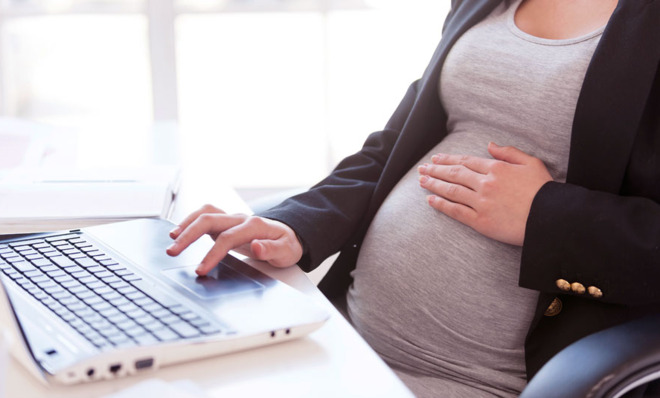The feminist battle that too many women ignore
Why fair treatment for pregnant women at work should be a new rallying cry


A free daily email with the biggest news stories of the day – and the best features from TheWeek.com
You are now subscribed
Your newsletter sign-up was successful
The fight for reproductive rights has been the dominant rallying point among feminists for at least a decade. As state after state continues to roll back abortion rights, and some even fear the eventual overturning of Roe v. Wade, this is most certainly a good thing. But perhaps it's time for women to lend some fire to another issue, one that arguably has more of an effect on a greater number of women's lives. It could even drum up bipartisan support. The cause: getting pregnant women just treatment in the workplace.
On Dec. 3, the Supreme Court will hear Young v. United Parcel Service, a pregnancy-discrimination case that will determine whether pregnant women can request to be accommodated at work like other employees. Peggy Young was a part-time driver for UPS who was forced to go on unpaid leave when the company wouldn't grant her request to only lift boxes 20 pounds or lighter during her pregnancy. (Her job description required that she lift 70 pounds.)
This case arrives at a moment when legislation to protect pregnant workers is being passed in places like Illinois, West Virginia, Delaware, and New York City. There is even a bill floating around Congress to ensure "reasonable workplace accommodations" for pregnant workers. This would be a much-needed follow-up to 1978's Pregnancy Discrimination Act (PDA), which prohibits employers from discrimination because of pregnancy but does not require them to make special accommodations for pregnant women.
The Week
Escape your echo chamber. Get the facts behind the news, plus analysis from multiple perspectives.

Sign up for The Week's Free Newsletters
From our morning news briefing to a weekly Good News Newsletter, get the best of The Week delivered directly to your inbox.
From our morning news briefing to a weekly Good News Newsletter, get the best of The Week delivered directly to your inbox.
The amicus brief filed by the ACLU and A Better Balance in support of Young reminds the court that before the PDA, women were routinely dismissed from their jobs while pregnant. It also warns that if the court sides with UPS, the situation might return to such a state "where women are one doctor's note away from financial ruin or disastrous health consequences."
And it's true: A loss could be an issue for the vast majority of women. Eighty percent of women become mothers, and, according to recent data, nearly two-thirds of women who gave birth in 2011 also worked around that time. (In comparison, only one in three women get an abortion in their life.) But that's not all.
Forty percent of women now act as the sole or primary breadwinners of their family, but motherhood leads to a 4 percent decrease in earnings for every child (men get a 6 percent increase!). Add it all up and pregnancy discrimination has the potential not only to maintain a stagnate wage gap but also to send families into poverty or debt.
So there is plenty to make to noise about, not just as mothers, but as all women committed to gender equality.
A free daily email with the biggest news stories of the day – and the best features from TheWeek.com
"This is a widespread issue that has tremendous impact on women's ability to maintain stable careers and achieve equality in the workplace and it disproportionately affects women working low-income jobs," said Dina Bakst, co-founder of A Better Balance. "Women are still choosing between being a mother and having a paycheck."
If Young wins, the victory won't just be legal, but also symbolic for all those who have been fighting to get our workplaces out of a 1950s state of mind. And, surprisingly, politicians from both sides of the aisle would be celebrating.
In this era in which feminism and liberalism have become pretty interchangeable, pregnancy discrimination is the rare issue that has Republicans and Democrats, anti-abortion and pro-abortion rights groups fighting for the same cause. A collective of 23 anti-abortion groups were among those who filed briefs in support of Young, claiming that a victory would "prevent the tragedy of needless and unwanted abortions forced upon a woman because she cannot afford to leave her job without pay to carry out the full term of her pregnancy." The recent anti-pregnancy discrimination law in Illinois passed with overwhelming bipartisan support, as did the one in Delaware and West Virginia.
While some feminists will surely resist working too closely with those who oppose abortion, others might view this as an opportunity to step outside their circles and increase the likelihood of making positive change. As writer and critic Judith Shulevitz puts it in her recent examination of the state of feminism today, getting legislation passed that will help working mothers will require "being willing to make compromises and unlikely alliances to get the necessary votes." By "unlikely" she means those who "fall afoul of Emily's List."
"I don't mean to give short shrift to reproductive rights; goodness knows my life has been predicated on them. But if we've got to choose for now, I choose health care, day care, and family leave. For now," Shulevtiz writes.
I feel similarly, and so did one of the founder's of the women's movement, Betty Friedan. In the 1998 update to her book The Second Stage, she writes:
I fear that feminists fall into a trap when they allow abortion to be seen as the feminist issue. … Abortion is not a value in itself and neither it nor other aspects of sexual life are the most significant issues for women's empowerment. What is most important is participating on equal terms in economic and political decision making.
This can't happen if something as fundamental as getting pregnant continues to be in conflict with something as fundamental as having a job.
Elissa Strauss writes about the intersection of gender and culture for TheWeek.com. She also writes regularly for Elle.com and the Jewish Daily Forward, where she is a weekly columnist.
-
 Properties of the week: pretty thatched cottages
Properties of the week: pretty thatched cottagesThe Week Recommends Featuring homes in West Sussex, Dorset and Suffolk
-
 The week’s best photos
The week’s best photosIn Pictures An explosive meal, a carnival of joy, and more
-
 The ‘ravenous’ demand for Cornish minerals
The ‘ravenous’ demand for Cornish mineralsUnder the Radar Growing need for critical minerals to power tech has intensified ‘appetite’ for lithium, which could be a ‘huge boon’ for local economy
